牛津深圳版英语七年级上册 Module 1 Unit 2 Daily life课时1 词汇课件(共17张PPT)
文档属性
| 名称 | 牛津深圳版英语七年级上册 Module 1 Unit 2 Daily life课时1 词汇课件(共17张PPT) |  | |
| 格式 | pptx | ||
| 文件大小 | 2.2MB | ||
| 资源类型 | 教案 | ||
| 版本资源 | 牛津深圳版 | ||
| 科目 | 英语 | ||
| 更新时间 | 2023-07-24 09:37:21 | ||
图片预览


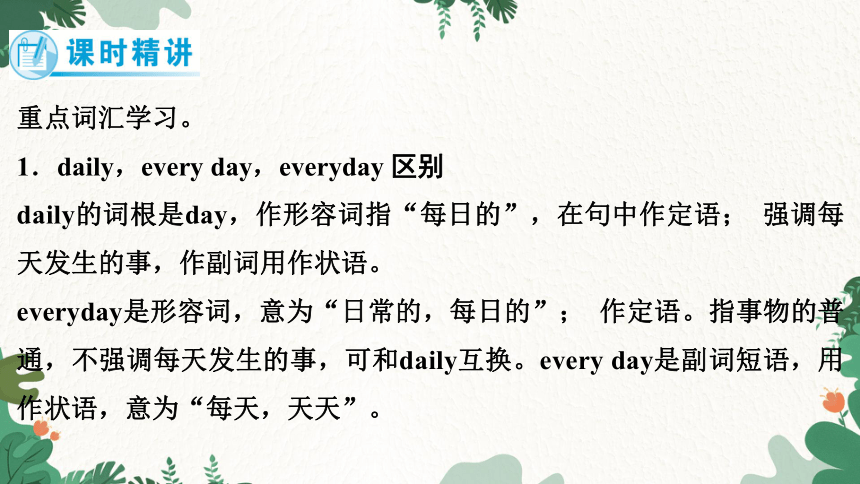
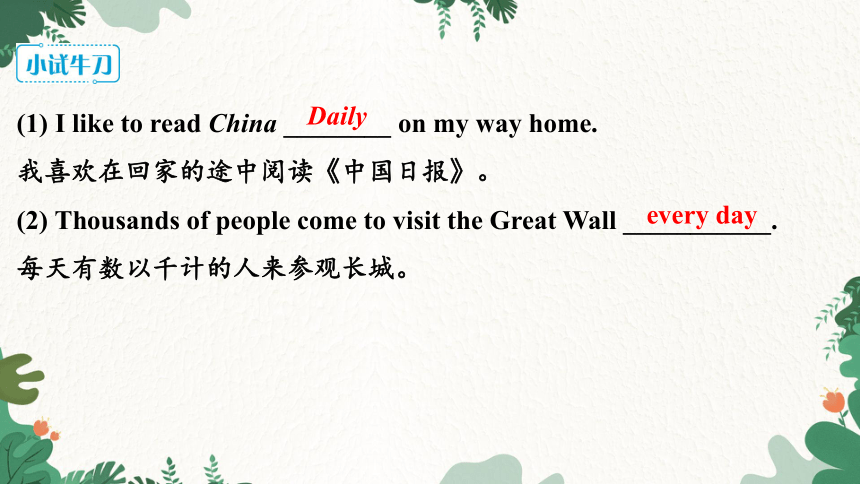
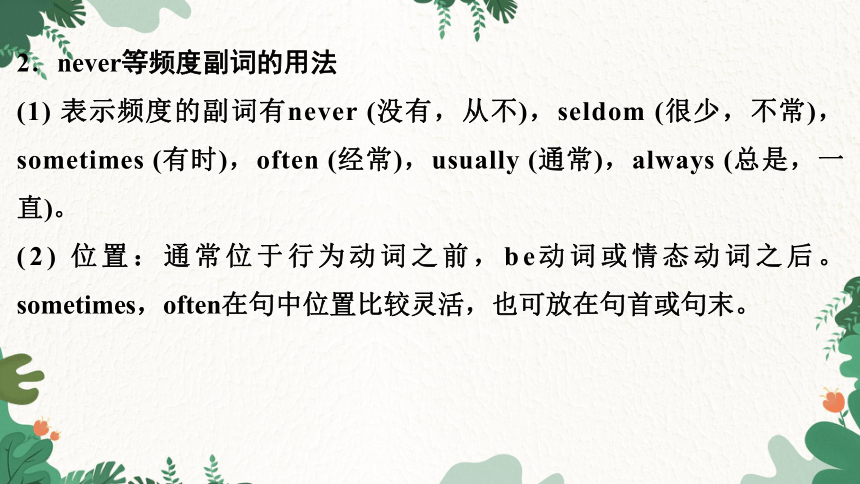
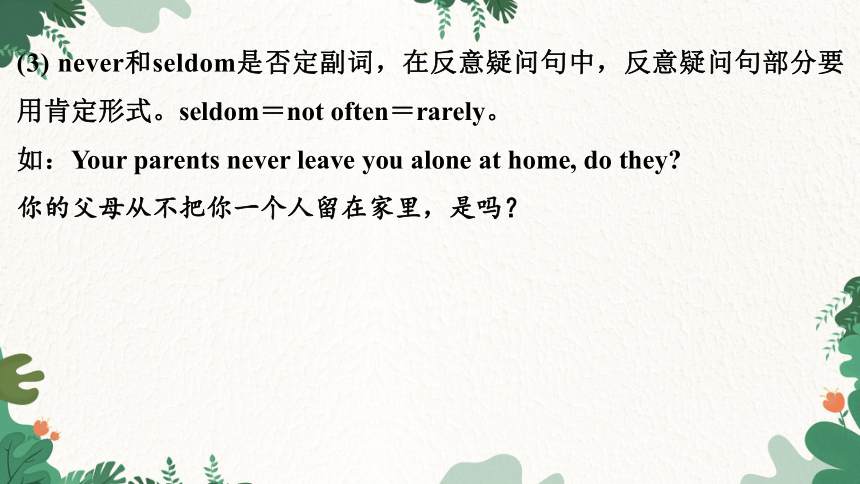
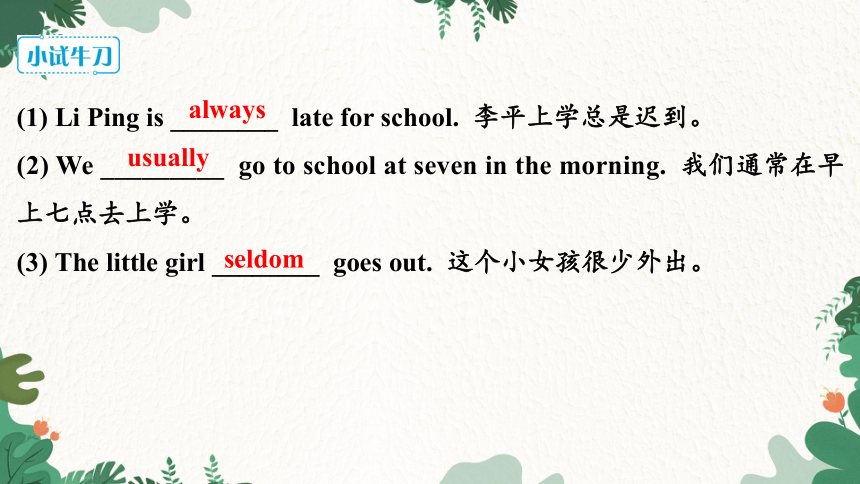
文档简介
(共17张PPT)
Unit 2 Daily life
课时1
词汇
一
课时精讲
三
四基三级练
二
课时过关
重点词汇学习。
1.daily,every day,everyday 区别
daily的词根是day,作形容词指“每日的”,在句中作定语; 强调每天发生的事,作副词用作状语。
everyday是形容词,意为“日常的,每日的”; 作定语。指事物的普通,不强调每天发生的事,可和daily互换。every day是副词短语,用作状语,意为“每天,天天”。
(1) I like to read China ________ on my way home.
我喜欢在回家的途中阅读《中国日报》。
(2) Thousands of people come to visit the Great Wall ___________.
每天有数以千计的人来参观长城。
Daily
every day
2.never等频度副词的用法
(1) 表示频度的副词有never (没有,从不),seldom (很少,不常),sometimes (有时),often (经常),usually (通常),always (总是,一直)。
(2) 位置:通常位于行为动词之前,be动词或情态动词之后。sometimes,often在句中位置比较灵活,也可放在句首或句末。
(3) never和seldom是否定副词,在反意疑问句中,反意疑问句部分要用肯定形式。seldom=not often=rarely。
如:Your parents never leave you alone at home, do they
你的父母从不把你一个人留在家里,是吗?
(1) Li Ping is ________ late for school. 李平上学总是迟到。
(2) We _________ go to school at seven in the morning. 我们通常在早上七点去上学。
(3) The little girl ________ goes out. 这个小女孩很少外出。
always
usually
seldom
3.ride的用法
(1) 用作动词,指骑、乘车/马。
It's too difficult for me to ride a bicycle. 对我来说骑自行车太难了。
(2) 用作名词,指骑马 (或乘车) 旅行; 兜风; 乘交通工具,车辆等。
We went for a ride in the car. 我们开车兜风。
(1) I'm learning to ______ a horse. 我正在学骑马。
(2) The first time he took me for a ______ was when I was 6.
在我六岁的时候,他第一次带我出去兜风。
ride
ride
4.practice的用法
practice作名词,意为“练习、惯例、实践”; 其动词为practise,意为“练习、训练”。
固定搭配practise doing sth., 但在美国英语中也可以用practice doing sth.。
(1) ___________ makes perfect. 熟能生巧。
(2) The young girl ___________ the violin every day.
这小女孩每天练习拉小提琴。
(3) You should practise __________ (speak) English every morning.
你应该每天早上练习说英语。
Practice
practises
speaking
5.join, join in, take part in和attend的用法比较
(1) join指加入某个党派、团体组织等,成为其成员之一,意为“参军、入团、入党”等。
join (sb.) 指参与某项活动,口语中常与take part in 通用。
(2) join in多指参加小规模的活动,如球赛、游戏等,常用于日常口语。
(3) take part in 指参加会议或群众性活动等,着重说明句子主语参加该项活动并在活动中发挥作用。
(4) attend是正式用语,及物动词,指参加会议、婚礼、葬礼、典礼; 去上课、上学、听报告等。句子的主语只是去听、去看,自己不一定起积极作用。
(1) He'll ________ an important meeting tomorrow.
他明天将参加一个重要的会议。
(2) We'll ______ ______ ____ social practice during the summer vacation.
暑假期间我们将参加社会实践。
(3) Why didn't you ______ ____ the talk last night 昨晚你为什么没参加座谈?
(4) When did your brother ______ the army 你哥哥什么时候参军的?
attend
take part in
join in
join
一、按要求写出下列单词的相应形式。
1.daily (名词) _____ 2.article (复数) __________
3.usually (形容词) _______ 4.break (同义词) ______
5.ring (过去式) ______ 6.end (同义词) __________________
7.practice (动词) __________ 8.seldom (同义词) ________
day
articles
usual
rest
rang
finish/complete
practise
rarely
二、用所给单词的适当形式完成句子或填入恰当的虚词。
1.Jack _______ (ride) a bike to school every morning.
2.The teacher asks me to read these ___________ (article) in a week.
3.My mother is _____ English teacher, and she often prepares her lessons at night.
4.He enjoys __________ (read) different stories.
5.Our classes begin ______ 8 o'clock in the morning.
rides
articles
an
reading
at
6.Tom plays the piano _______ (two) a week.
7.In the afternoon, we_________ (usual) have three classes.
8.The teacher asks us _________ (take) a short break now.
9.My father doesn't like going ___________ (shop).
10.It is ____________ (importance) for us to take part in the morning exercises every day.
twice
usually
to take
shopping
important
谢谢大家!
Unit 2 Daily life
课时1
词汇
一
课时精讲
三
四基三级练
二
课时过关
重点词汇学习。
1.daily,every day,everyday 区别
daily的词根是day,作形容词指“每日的”,在句中作定语; 强调每天发生的事,作副词用作状语。
everyday是形容词,意为“日常的,每日的”; 作定语。指事物的普通,不强调每天发生的事,可和daily互换。every day是副词短语,用作状语,意为“每天,天天”。
(1) I like to read China ________ on my way home.
我喜欢在回家的途中阅读《中国日报》。
(2) Thousands of people come to visit the Great Wall ___________.
每天有数以千计的人来参观长城。
Daily
every day
2.never等频度副词的用法
(1) 表示频度的副词有never (没有,从不),seldom (很少,不常),sometimes (有时),often (经常),usually (通常),always (总是,一直)。
(2) 位置:通常位于行为动词之前,be动词或情态动词之后。sometimes,often在句中位置比较灵活,也可放在句首或句末。
(3) never和seldom是否定副词,在反意疑问句中,反意疑问句部分要用肯定形式。seldom=not often=rarely。
如:Your parents never leave you alone at home, do they
你的父母从不把你一个人留在家里,是吗?
(1) Li Ping is ________ late for school. 李平上学总是迟到。
(2) We _________ go to school at seven in the morning. 我们通常在早上七点去上学。
(3) The little girl ________ goes out. 这个小女孩很少外出。
always
usually
seldom
3.ride的用法
(1) 用作动词,指骑、乘车/马。
It's too difficult for me to ride a bicycle. 对我来说骑自行车太难了。
(2) 用作名词,指骑马 (或乘车) 旅行; 兜风; 乘交通工具,车辆等。
We went for a ride in the car. 我们开车兜风。
(1) I'm learning to ______ a horse. 我正在学骑马。
(2) The first time he took me for a ______ was when I was 6.
在我六岁的时候,他第一次带我出去兜风。
ride
ride
4.practice的用法
practice作名词,意为“练习、惯例、实践”; 其动词为practise,意为“练习、训练”。
固定搭配practise doing sth., 但在美国英语中也可以用practice doing sth.。
(1) ___________ makes perfect. 熟能生巧。
(2) The young girl ___________ the violin every day.
这小女孩每天练习拉小提琴。
(3) You should practise __________ (speak) English every morning.
你应该每天早上练习说英语。
Practice
practises
speaking
5.join, join in, take part in和attend的用法比较
(1) join指加入某个党派、团体组织等,成为其成员之一,意为“参军、入团、入党”等。
join (sb.) 指参与某项活动,口语中常与take part in 通用。
(2) join in多指参加小规模的活动,如球赛、游戏等,常用于日常口语。
(3) take part in 指参加会议或群众性活动等,着重说明句子主语参加该项活动并在活动中发挥作用。
(4) attend是正式用语,及物动词,指参加会议、婚礼、葬礼、典礼; 去上课、上学、听报告等。句子的主语只是去听、去看,自己不一定起积极作用。
(1) He'll ________ an important meeting tomorrow.
他明天将参加一个重要的会议。
(2) We'll ______ ______ ____ social practice during the summer vacation.
暑假期间我们将参加社会实践。
(3) Why didn't you ______ ____ the talk last night 昨晚你为什么没参加座谈?
(4) When did your brother ______ the army 你哥哥什么时候参军的?
attend
take part in
join in
join
一、按要求写出下列单词的相应形式。
1.daily (名词) _____ 2.article (复数) __________
3.usually (形容词) _______ 4.break (同义词) ______
5.ring (过去式) ______ 6.end (同义词) __________________
7.practice (动词) __________ 8.seldom (同义词) ________
day
articles
usual
rest
rang
finish/complete
practise
rarely
二、用所给单词的适当形式完成句子或填入恰当的虚词。
1.Jack _______ (ride) a bike to school every morning.
2.The teacher asks me to read these ___________ (article) in a week.
3.My mother is _____ English teacher, and she often prepares her lessons at night.
4.He enjoys __________ (read) different stories.
5.Our classes begin ______ 8 o'clock in the morning.
rides
articles
an
reading
at
6.Tom plays the piano _______ (two) a week.
7.In the afternoon, we_________ (usual) have three classes.
8.The teacher asks us _________ (take) a short break now.
9.My father doesn't like going ___________ (shop).
10.It is ____________ (importance) for us to take part in the morning exercises every day.
twice
usually
to take
shopping
important
谢谢大家!
